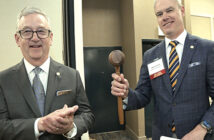Delegate Terry Kilgore, Big Stone Gap Town Manager Steve Lawson, InvestSWVa Project Lead Will Payne and Duane Miller, Executive Director of the LENOWISCO Planning District Commission show the plans for a co-working space in the basement of the former Mutual Pharmacy building.
The Virginia Tobacco Region Revitalization Commission Thursday highlighted a Southwest Economic Development program grant award of $250,263 to assist the town of Big Stone Gap in adding entrepreneurial co-working space to the renovated Mutual Pharmacy property. The grant was originally awarded in October. The town is modeling this co-working space after successful spaces in other localities and is presently designing its co-working operations program to fit within this unique downtown space. The location also ties in with a successful recent downtown revitalization effort as part of a strategy to attract new businesses and grow existing ones.
Tobacco Commission Chair, Delegate Terry Kilgore said, “Attracting new businesses to our rural towns and communities has been a challenge but it is one the Commission, along with our local and regional partners, is having success in meeting. Projects like this new co-working space in Big Stone Gap serve as an anchor for new businesses giving them a place to launch and grow. I look forward to participating in additional events like the forum held today that allow us to get together with our regional stakeholders and discuss the best strategies for invigorating our economy.”
“We are focused on making Big Stone Gap attractive to working professionals as a great place to both live and work,” said Steve Lawson, Town Manager for Big Stone Gap. “This grant will help us continue to revitalize our downtown district and recruit new business opportunities.”
Along with the grant announcement the Tobacco Commission, Invest SWVA and Lonesome Pine RIFA sponsored a Forum on Smart Communities that was attended by community leaders from across Southwest Virginia. The Forum served as a discussion of ways communities in Southwest Virginia can become better connected and utilize technology to attract new businesses to grow their local economies and that of the region as a whole. The Forum featured presentations by David Ihrie, Chief Technology Officer for the Center for Innovative Technology and Charles Neal, Managing Director of Operations Transformation for Deloitte Consulting LLP.
“Co-working spaces like this one in Big Stone Gap are a critical business recruitment tool for us as we continue to market the region to Northern Virginia-based high-tech companies looking to grow their operations in Southwest Virginia,” said Will Payne, who serves as project lead for InvestSWVA, a newly-formed regional marketing initiative backed by the Tobacco Commission and corporate partners around the region, including Point Broadband and Appalachian Power.
Payne’s firm, Coalfield Strategies, is leading the Invest SWVA initiative, funded by the Tobacco Commission, Point Broadband, LENOWISCO, and Appalachian Power. This public-private initiative covers the 13 counties and 3 cities in the GO Virginia Region One footprint. Payne tapped Hunton Andrews Kurth LLP’s Global Economic Development practice, led by former Secretary of Commerce and Trade Todd Haymore, as its strategic advisor. At InvestSWVA’s launch in September, co-chairs Senator Ben Chafin, Delegate Terry Kilgore, Delegate Israel O’Quinn, and Senator-elect Todd Pillion announced a first-of-its-kind strategic partnership with the Northern Virginia Technology Council to offer growth opportunities in the region to its member companies.
“Developing co-working spaces in small towns like Big Stone Gap creates the potential for both downtown redevelopment and job creation in one fell swoop — a win-win proposition for Southwest Virginia,” said Duane Miller, Executive Director of the LENOWISCO Planning District Commission.
LENOWISCO’s localities (Lee, Wise and Scott counties and the city of Norton) in addition to Dickenson County comprise the Lonesome Pine Regional Industrial Facility Authority. This Authority, the first of its kind in Southwest Virginia, supports revenue sharing and serves as a mechanism for sharing resources.
“The CIT Smart Communities team is honored to support Big Stone Gap in their mission to improve and modernize community resources and services through smart technology,” said David Ihrie, Chief Technology Officer for the Center for Innovative Technology. “Communities like Big Stone Gap can be an ideal environment for smart initiatives to make a big difference in the quality of life for the people who live there. We are thrilled to be a part of the plan to deploy their vision for the future.”
Ihrie is co-leading the Virginia Smart Communities Working Group and, along with CIT Broadband, is helping bring this new generation of capability to all Virginians.
“Improving connectivity can impact almost every corner of a community from education and mobility to public safety and overall prosperity,” said Charles Neal, principal, Deloitte Consulting LLP. “What will make improved connectivity possible is collaboration across the public, private and nonprofit sectors, which is now happening in Big Stone Gap thanks to the many community partners involved. By working together, identifying clear goals and developing a clear understanding of the obstacles and available options, towns such as Big Stone Gap can reap the benefits of being a smart, connected community.”
Deloitte Consulting LLP’s Smart Rural Communities Practice explores the economic transformation of underserved rural areas in the United States through enhanced connectivity. Their work convenes community and government stakeholders, private industry providers, and experts to serve as a catalyst for designing innovative strategies and solutions to the challenges rural communities face. These strategies help federal, state, and local agencies realize the cascading impacts of connectivity for their industries and communities in pursuit of rural prosperity.




